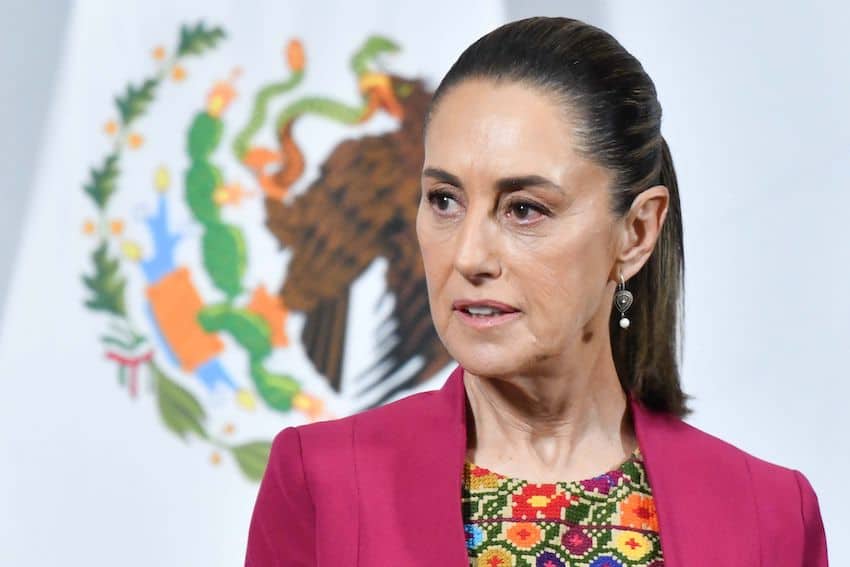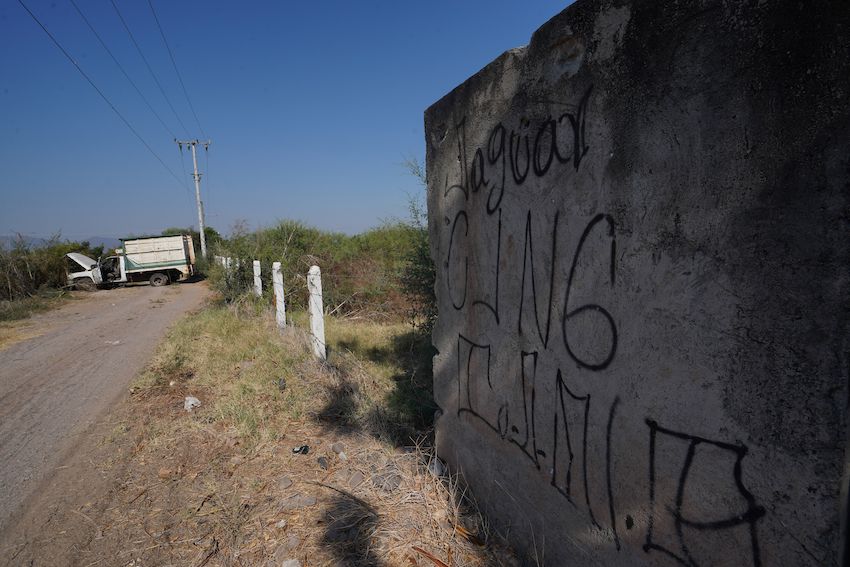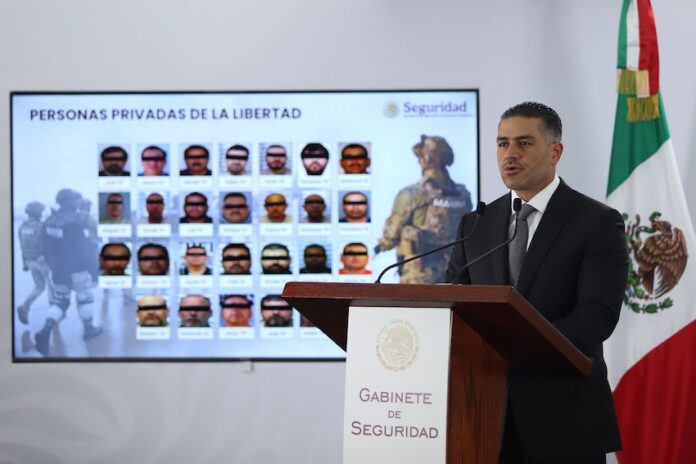Mexican and United States authorities announced on Tuesday that 26 organized crime figures had been sent to the U.S., marking the second large transfer of Mexican prisoners to the U.S. this year.
Federal Security Minister Omar García Harfuch announced on social media that Mexico’s Security Cabinet, in an act of “bilateral coordination” and “with full respect for our sovereignty, transferred to the United States 26 people linked to criminal organizations who represented a risk for the security of Mexico.”
“The action was carried out in strict adherence to the National Security Law and at the request of the U.S. Department of Justice, which committed to not seek the death penalty,” García Harfuch wrote.
The U.S. Justice Department said in a statement that it had taken into custody “26 fugitives from Mexico facing a range of federal and state criminal charges…, including charges relating to drug-trafficking, hostage-taking, kidnapping, illegal use of firearms, human smuggling, money laundering, the murder of a sheriffs’ deputy, and other crimes.”
It said that “leaders and managers of dangerous drug cartels,” including the Sinaloa Cartel, the Jalisco New Generation Cartel (CJNG) and the Northeast Cartel, are among the fugitives sent to the United States.
“These fugitives are collectively alleged to have imported into the United States tonnage quantities of dangerous drugs, including cocaine, methamphetamine, fentanyl, and heroin,” the Justice Department said.
Desde la “Base militar aérea No. 1”, 26 generadores de violencia fueron trasladados a Estados Unidos en un operativo conjunto del @GabSeguridadMX, con once aeronaves de la @Defensamx1 y una de la @SEMAR_mx. Conoce el mapa para saber en qué estados enfrentarán cargos: pic.twitter.com/b5CUimA81G
— Gabinete de Seguridad de México (@GabSeguridadMX) August 13, 2025
The transfer of the 26 people who were wanted in the U.S. came almost six months after Mexico sent 29 cartel figures, including notorious drug lord Rafael Caro Quintero, to the United States.
President Claudia Sheinbaum and her government have come under intense pressure from U.S. President Donald Trump and his administration to do more to combat Mexican cartels and their illicit activities, including the trafficking of large quantities of drugs to the U.S.
The transfer of the 29 prisoners in February came as Trump was threatening to impose 25% tariffs on all imports from Mexico. The U.S. president did impose blanket tariffs on Mexican goods in early March, but lifted the 25% duty on USMCA-compliant products two days later.
The latest transfer of people came just a few days after it was revealed that Trump had signed a directive to the Pentagon to begin using military force against certain Latin American drug cartels that the U.S. government has designated as foreign terrorist organizations.
The New York Times reported that the transfer was an “apparent bid” by Mexico “to alleviate the intense pressure from President Trump to do more to combat the powerful groups smuggling fentanyl across the border.”
But Sheinbaum said on Wednesday morning that the decisions to send 26 prisoners to the United States this month and 29 in February were made “for the security of our country.”
“They are sovereign decisions,” she said.
Sheinbaum has repeatedly said that Mexico is willing to cooperate and collaborate with the United States on security issues, but will never accept subordination or any violation of its sovereignty. She said on Monday that Mexico “would never allow the United States Army or any other institution of the United States to set foot on Mexican territory.”

García Harfuch told a press conference on Wednesday that there was a risk that some of the prisoners sent to the United States could have been released from — or escaped from — jail.
“Many of them had obtained injunctions to remain in low-security prisons, and it was even anticipated that others currently held in federal penitentiaries would receive similar rulings that would facilitate their transfer to less-guarded state prisons, increasing the risk of continuing their criminal operations or even the risk of escape,” he said.
“There were also lawsuits and legal appeals seeking their early release, which, if achieved, would have meant a setback in the fight against crime and an affront to the victims.”
Who was sent to the United States?
The U.S. Justice Department (DOJ) published a complete list of the 26 fugitives that Mexico transferred to the United States.
The most prominent name on the list is that of Abigael González Valencia, who had been considered the top leader of Los Cuinis, a crime organization affiliated with the CJNG.
González, known as “El Cuini,” is the brother-in-law of Nemesio “El Mencho” Oseguera Cervantes, the leader of the CJNG. González was arrested in Puerto Vallarta, Jalisco, in 2015.
The DOJ said that Los Cuinis is “a major Mexican drug cartel responsible for trafficking multiple tons of cocaine from South America, through Mexico, into the United States.”

The organized crime group has been described as the financial arm of the CJNG.
In 2025, González’s brother, José González Valencia was sentenced to 30 years in prison in the United States “for his role in a major drug trafficking conspiracy,” according to the DOJ.
In addition to “El Cuini” González, the DOJ provided brief profiles of eight other prisoners who were transferred to the United States. Those people are:
- Kevin Gil Acosta and Martín Zazueta Pérez, identified in court documents as “leaders of the security apparatus for the Chapitos,” a faction of the Sinaloa Cartel led by sons of imprisoned drug lord Joaquín “El Chapo” Guzmán. “Both men have led sicarios armed with military-style weapons … in attacks on Mexican government and military officials,” the DOJ said.
- Abdul Karim Conteh, a national of Sierra Leone, who the DOJ said “allegedly led a human smuggling organization that smuggled thousands of migrants to the United States through Mexico.”
- Leobardo García Corrales, who the DOJ said “is believed to be an important figure in the Sinaloa Cartel who has trafficked kilogram quantities of fentanyl into the United States.”
- Luis Raúl Castro Valenzuela, “a member of the Sinaloa Cartel, has been charged with kidnapping and holding hostage a U.S. citizen.”
- Juan Carlos Felix Gastelum, “a major Sinaloa Cartel cell leader and son-in-law to former Sinaloa Cartel leader Ismael ‘El Mayo’ Zambada.” The DOJ said he is “alleged to be a principal operator of the Sinaloa Cartel’s clandestine methamphetamine manufacturing laboratories located in the Sierra Madre Mountains of Sinaloa and Durango.”
- Roberto Salazar, a man the DOJ said is “wanted in connection with the murder of Los Angeles County Sheriff’s Deputy Juan Escalante, who was killed in 2008 when he was leaving his home during the early morning hours.”
- Pablo Edwin Huerta Nuno, who the DOJ said is “a violent Tijuana Plaza boss who has operated with impunity during the last 15 years” and is “alleged to have supplied thousands of kilograms of methamphetamine, fentanyl, and cocaine to distributors and cells located throughout San Diego and Los Angeles.”
Another of the prisoners sent to the United States was Servando “La Tuta” Gómez Martínez, an ex-leader of the La Familia Michoacana and Caballeros Templarios cartels.
All but one of the 26 prisoners transferred to the United States face sentences of up to life imprisonment if convicted, according to the DOJ. The men face charges in a number of U.S. states, including California, Texas, New York, New Mexico, Virginia, Illinois, Arizona and Alaska.
The 26 men had been held in various prisons in Mexico before they were flown to the United States.
US Embassy commends ‘significant milestone’ in US-Mexico law enforcement collaboration
The United States Embassy in Mexico expressed its satisfaction with the decision to transfer the 26 organized crime figures to the U.S.
“We commend the Government of Mexico for its continued and courageous cooperation in transferring 26 additional high-profile fugitives to the United States,” the embassy said in a statement.
Reconocemos al @GabSeguridadMX por su dedicación y compromiso. Esta acción refleja la solidez de nuestra cooperación bilateral como aliados soberanos y nuestro compromiso compartido de garantizar la seguridad y el bienestar de nuestros pueblos. https://t.co/XbuqLNtmNK
— Embajador Ronald Johnson (@USAmbMex) August 13, 2025
“Building on the unprecedented action earlier this year involving 29 fugitives, this coordinated effort represents another significant milestone in U.S.-Mexico law enforcement collaboration and in the partnership between Presidents Trump and Sheinbaum,” it said.
United States Ambassador to Mexico Ron Johnson said that the transfer of the prisoners is “yet another example of what is possible when two governments stand united against violence and impunity.”
“These fugitives will now face justice in U.S. courts, and the citizens of both of our nations will be safer from these common enemies,” he said.
U.S. Attorney General Pam Bondi said that the transfer of the prisoners “is the latest example of the Trump administration’s historic efforts to dismantle cartels and foreign terrorist organizations.”
“These 26 men have all played a role in bringing violence and drugs to American shores. Under this Department of Justice, they will face severe consequences for their crimes against this country. We are grateful to Mexico’s national security team for their collaboration in this matter,” Bondi said.
Drug Enforcement Administration chief Terry Cole said that the transfer of the 26 prisoners is “a significant step in DEA’s ongoing effort to dismantle cartels designated as foreign terrorist organizations.”
The United States designated the Sinaloa Cartel, the CJNG, the United Cartels, the Northeast Cartel, the Gulf Cartel and La Nueva Familia Michoacana as foreign terrorist organizations in February.
Mexico News Daily
